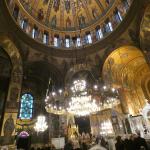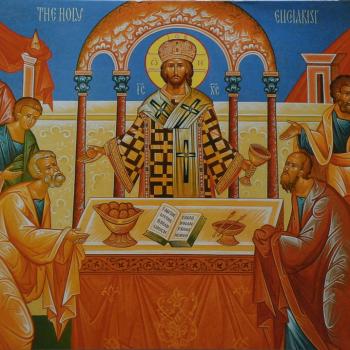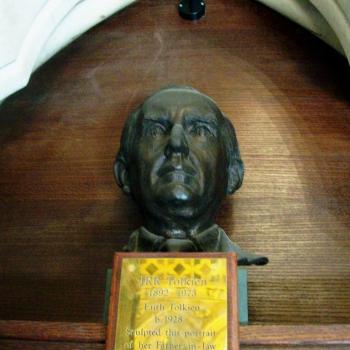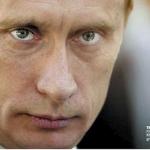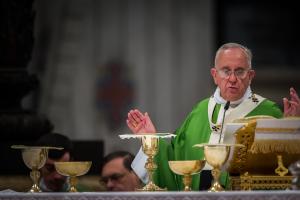
We must not confuse our faith with accidents which can and do change. This is especially true in regards liturgy. While liturgical worship is important, we must accept that it can and will change. There is not one liturgical form which has always been in use since the inception of the Christian faith. There is no “Mass of the Ages.” There are various liturgies which have been established and can be and are to be used today. There are many liturgies which are no longer in use. There will likely be many new forms of liturgy in the future, even as and many liturgies used today might not be used in the future. We might have preferences, there might be forms of liturgy which move us more than others, but that does not mean what is true for us is true for everyone. Similarly, many of the reasons which we use to promote our liturgical preference end up erroneous, as they end up absolutizing our preferences, suggesting they are holier than they are. When we do this, we risk turning our preferences, and the liturgy, into idols, distracting us from the true purpose and use of liturgy. If spiritual leaders and authorities see such idolatry becoming widespread, they have the authority, if not the duty, to deal with such it, and that might mean, they might have to limit or actually forbid particular forms of liturgy in order to remind Christians the liturgy is not what makes the faith, but the faith the liturgy.
“Reject those who take pride in ornate <liturgical> vessels, and the office of the community, and the festal table.” [1]
Through these words, St. Isaac the Syrian warns us of the kinds of attitudes towards liturgy and their celebration which can and do lead us astray. Those who think the liturgy has to be ornate, as ornate as possible, do not understand liturgy, as their assumptions would undermine some of the most holy forms of liturgy performed in history, such as what happened at the Mystical (Last) Supper. Early Christians were not so concerned with such liturgical splendor, nor should Christians today be consumed by it either, especially when we think of the way earthly splendor compares to the way of divine splendor as revealed to us by Jesus on the cross. When we conform the liturgy to represent earthly glory and aesthetics, we risk obscuring the true divine glory which we can and should experience. This is because our focus is no longer on the divine glory but on earthly glory. This can lead us to idolatry because what is merely earthly is treated as being divine. It is this confusion which we see running rampant with many so-called Catholic traditionalists; they proclaim their liturgical preferences to be superior to all others because of its earthly aesthetics and the earthly glory which is on display. In this way, they undermine the symbolic value of the liturgy as they confuse accidents with essentials, leading to the idolization of particular liturgical forms.
The restoration of the liturgy should be able the restoration of a proper understanding and place of liturgy in the Christian life. It should promote liturgy as a central point in the Christian life, but it should do so by remining us of the true value and intent of liturgy. It tells us that liturgies should engage the people where they are at and help them truly connect to the reality being pointed at through the symbols used in them without absolutizing or necessitating those symbols. It explains that the form of the liturgy can be and should be adapted; indeed, no liturgical form should be seen as set in stone (which, historically, is proven the case by those who study liturgy).
Pope Francis has seen the resistance many in the so-called traditionalist communities have had with proper liturgical development. He has seen how they have treated their preferred from of liturgy as a universal norm by which all other liturgies are to be judged, and also, as the norm which most should follow. They think the accidents of their form are what make the liturgy; they have done which should not be done, which is turn liturgical accidents into necessities, thereby proclaiming that theirs is the best form of liturgy and it should never be changed. They have made the liturgy into an immobile idol which everyone must bow before, and in doing so, they show they have lost sight of the greater Christian faith. They have made what makes someone a Christian, someone a Catholic, dependent upon their relationship to a particular liturgical idol. Pope Francis knows he needs to deal with this sentiment; while he has tried to be compassionate with them and help them find their way to the liturgical norm, he has seen their continued resistance to the church and its ongoing development, a resistance which has become a poison within the Christian community. Pope Francis’s restrictions to the so-called “Traditional Lass Mass” is a necessary antidote for that poison.
Many of those resisting Pope Francis, though they do not themselves really follow or accept the teachings of Vatican Council II, try to use its decrees to justify their rebellion. They say that the council promoted the use of Latin, acting as if the council suggested such use must be perpetuated into the future. Yet, what they reference, Sacrosanctum concilium, does not say that. We read, at the time of its promulgation, Latin was still in use, and so the decree said Latin should still be used and preserved in the Latin Rite. [2] But it also stated that the liturgy does not have to be in Latin, that vernacular languages could be used. How much needed to be done in Latin, and how much of the liturgy could be done in the vernacular, the council left to competent ecclesiastical authorities, such as bishops, or, if need be, the Apostolic See (that is, the Pope). That is, when the Pope (or competent authorities approved by the Pope) allow for the use of vernacular, then Latin no longer has to be used (and indeed, could in theory be suppressed). This is why after Vatican II, more and more liturgies were rendered into the vernacular. Such development did not contradict Vatican II because it is exactly what Vatican II said could be done:
-
Particular law remaining in force, the use of the Latin language is to be preserved in the Latin rites.
-
But since the use of the mother tongue, whether in the Mass, the administration of the sacraments, or other parts of the liturgy, frequently may be of great advantage to the people, the limits of its employment may be extended. This will apply in the first place to the readings and directives, and to some of the prayers and chants, according to the regulations on this matter to be laid down separately in subsequent chapters.
-
These norms being observed, it is for the competent territorial ecclesiastical authority mentioned in Art. 22, 2, to decide whether, and to what extent, the vernacular language is to be used; their decrees are to be approved, that is, confirmed, by the Apostolic See. And, whenever it seems to be called for, this authority is to consult with bishops of neighboring regions which have the same language.
-
Translations from the Latin text into the mother tongue intended for use in the liturgy must be approved by the competent territorial ecclesiastical authority mentioned above. [3]
Thus, far from saying Latin should always and forever be the norm (in the Latin Rite), the decree only said at the point it was being promulgated, Latin was the norm. It made it clear that the church can (and would) promote vernacular liturgies. This, of course, was done to help the people, so that they truly could and would engage the liturgy more, which was one of the reasons liturgical form was needed:
In the restoration and promotion of the sacred liturgy, this full and active participation by all the people is the aim to be considered before all else; for it is the primary and indispensable source from which the faithful are to derive the true Christian spirit; and therefore pastors of souls must zealously strive to achieve it, by means of the necessary instruction, in all their pastoral work. [4]
Once, again, Vatican II made it clear that the regulation of the liturgy, and so liturgical development, is ultimately in the hands of the Pope. That is, the Pope has the final authority to make liturgical demands (though, bishops, in a relative sense, so long as they do not go against the authority of the Pope and what the Pope has declared, have a flexibility of their own): “Regulation of the sacred liturgy depends solely on the authority of the Church, that is, on the Apostolic See and, as laws may determine, on the bishop.” [5] The church is meant to continue to discern the needs of the people, to help them become actual participants in the liturgy and not just remain mere spectators or doing their own alternative devotions. To make this happen, it was understood, more liturgical develops could and would occur, with the Pope, once again, holding the final authority in making determinations which developments and how they were to occur. The council did not assume things would remain the same because it knew the liturgy has never remained the same; it has always been changing and developing.
Thus, it is important for the church to listen to and deal with the needs of the people, engaging them in such a way as to best promote the lived-experience of the Gospel and all the truths which have been revealed to us by Christ. If and when someone wants to undermine that by forcing their own personal, limited, preferences upon the church, hoping to force the church, even the Pope, to give way to them and their limited desires, the words of St. Hilary of Poitier are appropriate:
And what gain is there in a doctrine that seeks after what is pleasing rather than what is to be taught? Or what holiness is there in a doctrine where they do not desire what is to be taught but to assemble doctrines for that which they desire. But these things offer inducements to seducing spirits and confirm the errors of the pretended worship of God.”[6]
When someone seeks only what is pleasing to themselves and their desires, denying the universal breadth of the church, and its inclusive nature, they must be redirected, sometimes by having that which they hold as their center removed so that they can once again find the true center of the faith. This is why those who resist liturgical development and the Pope might need to be corrected by being denied that which they use to promote their resistance, especially when they use that rebellion not only to reject the Pope and his liturgical authority, but various teachings of the church when they run contrary to their own ideology (such as happens with social doctrine). They are being told to be more inclusive and accept the wide diversity found in the church for their own benefit, for by embracing such catholicity, they will be able to follow the catholicity of Christ himself. Sadly, the limited perspective they use to make their demands, and so to restrict the church, ends up undermining what Christ wanted for the church. And since they have had decades to listen to the church, their resistance only makes things worse, not better. This is why Cardinal Cupich was right to point out that we have had, as a community, several decades to deal with Vatican II:
Let us remember that in those Roman documents, the successor of Peter, who is the guarantor of unity in the church, called bishops to assist all Roman Catholics to accept fully that the liturgical books promulgated by St. Paul VI and St. John Paul II are the unique expression of the lex orandi (the law of praying) of the Roman Rite. The fact that the Holy Father had to do this 60 years after the Second Vatican Council saddens but does not surprise me. Over my 50 years as a priest and 25 as a bishop, I have seen pockets of resistance to the council’s teachings and reforms, especially the refusal to accept the restoration of the liturgy.[7]
It is not as if Pope Francis made a radical change in the direction of the church and its practices. He is, rather, making sure that those who have long held out and resisted the council, and the developments it promoted, realize that they have been given sufficient time to come to terms with the church. Now, if they are unwilling to do so, the fault lies with them. They are promoting themselves and their limited understanding and desires above the church and the Spirit’s guidance of the church. Instead of using the time and dispensations they were given properly, that is, to open up to the promptings of the Spirit and its guidance of the universal church, they have tried to continue to infect the church with their poison. They have used, and continue to use, their preferred liturgical form as a tool to spread their spiritual poison. Indeed, they have poisoned that well with such a strong poison, it was necessary for Pope Francis to close off access to that well until the poison is removed. The rest of the bishops should be working along with the Pope to do so:
The point is clear: If we bishops are serious about helping Catholics fully receive the teachings of the Second Vatican Council, then we have an obligation to promote, in union with the successor of Peter, the complete embrace of the council’s liturgical reforms. This is the reason Pope Francis has called all Catholics to accept Vatican II’s restoration of the liturgy as the unique expression of the lex orandi of the Roman Rite. His aspiration has deep roots in the ancient church tradition first uttered by Prosper of Aquitaine: [8]
We should listen to the church. We must not let one of the several great errors get in the way of doing so. “They say that the real hindrances and veils of the servant are four: the world, creatures, Satan, and one’s ego. This world veils the next; creatures, worship; Satan, religion; our ego, the Lord.” [9] The more we promote our own wants and desires over the universal church, the more we declare our own aesthetics as superior to all others and judge all others in light of our preferences, we will not be able to engage the liturgy properly because we will make it a tool for our own prideful self-glorification. Just because we claim our aesthetic to be other-worldly does not make it so; in some contexts, they can be, but the same exact aesthetics, once we promote them with worldly claims, no longer serve as pointers to the supernatural, other-worldly truths and experiences we should have with them. This is because we have become so focused on the way of the world, and worldly glory we see in them we lose sight of the heavenly glory. Thus, we see so many confuse worldly glory as supernatural glory, and in doing so, once again, lead not only to idolatry, but to the abuses of idolatry as people are forced to sacrifice themselves and their true needs for the sake of that petty glory.
Liturgy is important. It is to be creative. It is not to be limited. It should develop, dealing with the needs of the people. It should be a part of the living tradition which changes and develops, not the tradition of the dead who do not change. Indeed, when we properly understand liturgy, we will understand liturgy is not just one type of worship, however special it is, but something which should be seen and experienced throughout our life, which itself can be seen as one great liturgical celebration, where, through our words and deeds, and the beauty within them, we not only offer God the praise which is God’s due, we find ourselves inspired by God and directed by the Spirit to make our whole life a thing of beauty:
How lofty and holy is this work! The Lord gives strength. He sends inspiration, and by the Holy Spirit beauty is imprinted. Human art brings Him satisfaction, and blessed is he who can and who wishes to devote this art to Him. And if this creative work – done in a small corner and imperceptible to the world – pleases the Lord, then what blessedness will come if people begin to do all things in the Lord, if the eternity of life becomes praise, becomes liturgy. [10]
[1] St. Isaac of Nineveh, Headings on Spiritual Knowledge (The Second Part, Chapters 1-3). Trans. Sebastian Brock (Yonkers, NY: St Vladimir’s Seminary Press, 2022), 135 [Chapter 3; Second Discourse].
[2] But note, it does say anything about the form of the liturgy itself, that is, it did not say the Latin Rite must continue with the Tridentine forms of liturgical expression.
[3] Sacrosanctum concilium. Vatican translation. ¶35.
[4] Sacrosanctum concilium.¶14.
[5] Sacrosanctum concilium ¶22.
[6] St. Hilary of Poitiers, The Trinity. Trans. Stephen McKenna, CSSR (New York: Fathers of the Church, Inc., 1954), 401.
[7] Cardinal Blasé J. Cupich, “Cardinal Cupich: Critics Of Pope Francis’ Latin Mass Restrictions Should Listen To JPII” in America (2-27-2023)
[8] Cardinal Blasé J. Cupich, “Cardinal Cupich: Critics Of Pope Francis’ Latin Mass Restrictions Should Listen To JPII” in America (2-27-2023)
[9] Sharafuddin Maneri, The Hundred Letters. Trans. Paul Jackson, SJ (New York: Paulist Press, 1980), 142 [Letter 37].
[10] Sergius Bulgakov. Spiritual Biography. Trans. Mark Roosien and Roberto J. De La Noval (Brooklyn, NY: Angelico Press, 2022), 57, [5/18.IV.1924].
Stay in touch! Like A Little Bit of Nothing on Facebook.
If you liked what you read, please consider sharing it with your friends and family!
N.B.: While I read comments to moderate them, I rarely respond to them. If I don’t respond to your comment directly, don’t assume I am unthankful for it. I appreciate it. But I want readers to feel free to ask questions, and hopefully, dialogue with each other. I have shared what I wanted to say, though some responses will get a brief reply by me, or, if I find it interesting and something I can engage fully, as the foundation for another post. I have had many posts inspired or improved upon thanks to my readers.



